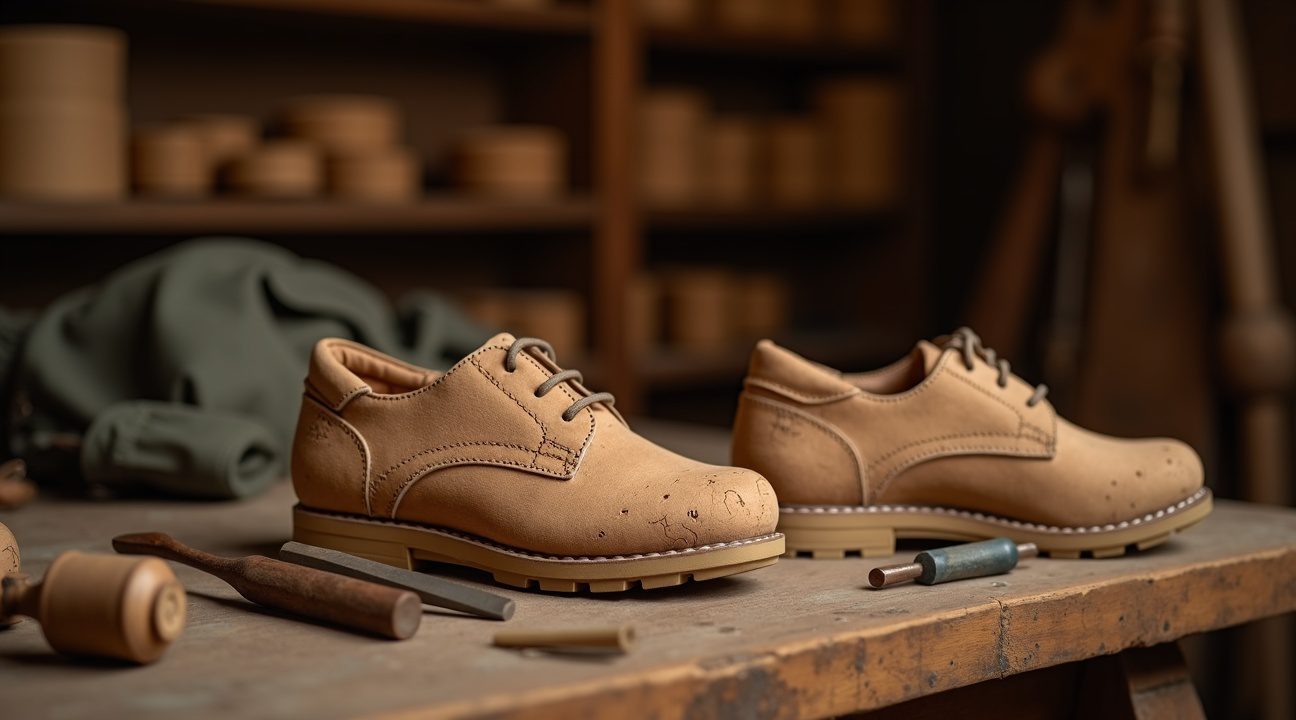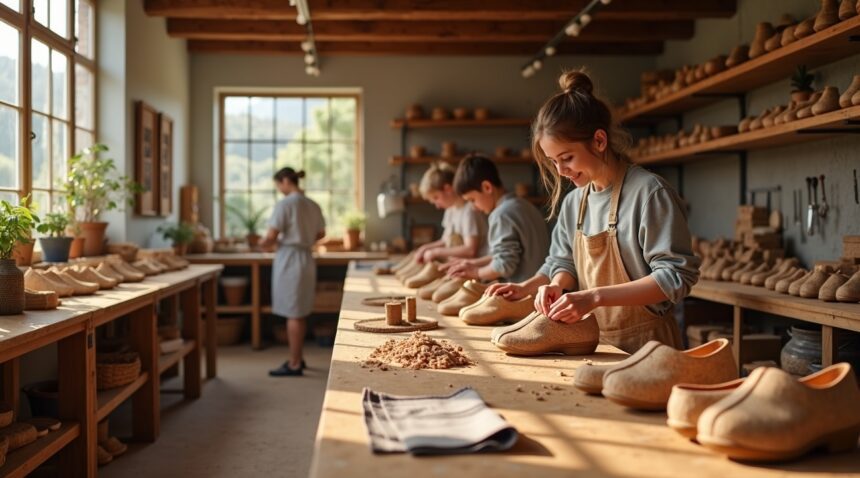Portuguese cork factories have revolutionized waste management through innovative partnerships with local shoemakers, turning cork offcuts into premium waterproof school shoes that highlight sustainability and traditional craftsmanship.
Key Takeaways
- Cork factories donate production offcuts to local shoemakers instead of discarding them, resulting in waterproof school shoes that retain cork’s natural water resistance and antimicrobial qualities.
- Each pair of shoes is handcrafted using time-honored Portuguese shoemaking techniques, ensuring both durability and affordability for families in need of robust footwear.
- The initiative supports circular economy principles, offering mutual benefits: reduced waste for manufacturers, access to premium cork material for shoemakers, and long-lasting children’s shoes for communities.
- Portugal supplies 50% of the world’s cork, making it uniquely positioned to implement and sustain such eco-conscious partnerships with an ample supply of raw materials.
- Rural communities gain economic empowerment through job creation and enduring collaborations between major cork producers and skilled local artisans.
To learn more about Portugal’s cork industry and its global impact, visit the Portuguese Cork Association (APCOR), which provides resources and further insight into the sustainable uses of cork.
Portuguese Factories Transform Cork Waste Into Waterproof School Shoes Through Community Partnerships
Cork factories across Portugal have discovered an innovative way to breathe new life into their industrial waste. I’ve observed how these facilities now donate offcuts—the unused pieces remaining after producing cork stoppers, flooring, and other premium products—to local shoemakers who transform them into waterproof school footwear.
Turning Industrial Waste Into Valuable Resources
This sustainable practice addresses a significant challenge in cork production. Factories generate substantial amounts of offcuts during manufacturing, and these materials previously contributed to industrial waste streams. However, these lower-grade cork pieces possess unique properties that make them perfectly suited for footwear applications.
Cork offcuts maintain the material’s natural water resistance and durability, even though they don’t meet the strict quality standards required for wine stoppers or premium flooring. I find this approach particularly clever because it allows manufacturers to utilize materials that would otherwise be discarded while preserving higher-grade cork for export markets.
The transformation process involves carefully sorting offcuts by size and quality. Shoemakers then incorporate these materials into specially designed school shoes, creating products that offer exceptional water resistance and longevity. Each pair receives individual attention during the handcrafting process, ensuring proper fit and construction quality.
Building Community Support Through Environmental Responsibility
Portuguese factories have recognized that this initiative serves multiple purposes beyond waste reduction. The donated materials enable local communities to access affordable, high-quality footwear for children. This support proves particularly valuable for families facing economic challenges, as traditional waterproof school shoes often carry premium price tags.
The community partnership model creates a sustainable cycle that benefits all participants:
- Factories reduce their waste disposal costs while contributing to social causes.
- Local shoemakers gain access to premium materials at no cost, allowing them to offer competitive pricing.
- Families receive durable footwear that withstands daily wear and Portugal’s varied weather conditions.
I’ve noticed that this initiative also strengthens relationships between industrial producers and local communities. Factories that participate often develop ongoing partnerships with schools and community organizations, creating lasting connections that extend beyond the initial material donations. Much like how athletes achieve milestones through consistent effort, these partnerships grow stronger through sustained collaboration.
The handmade aspect of production adds significant value to each pair of shoes. Skilled craftspeople apply traditional techniques combined with modern understanding of foot health and comfort. This attention to detail ensures that children receive footwear that supports proper development while providing the protection they need for school activities.
Environmental benefits extend beyond simple waste reduction. The circular economy approach minimizes the need for new raw materials while maximizing the utility of existing resources. Cork’s natural properties—including antimicrobial characteristics and temperature regulation—transfer to the finished footwear, creating products that promote foot health.
Factory owners have embraced this model because it aligns with Portugal’s broader sustainability goals. The country has positioned itself as a leader in environmental innovation, and these cork waste initiatives demonstrate practical applications of circular economy principles. Companies participating in these programs often report improved community relations and enhanced brand reputation.
The success of this initiative has sparked interest from other industries examining their own waste streams. Textile manufacturers, furniture producers, and even technology companies have begun exploring similar partnership models. The cork shoe program serves as a proof of concept for transforming industrial byproducts into community resources.
Distribution networks have evolved to support these initiatives, with schools, community centers, and local organizations serving as collection and distribution points. This decentralized approach ensures that shoes reach families who need them most while maintaining efficient logistics.
The waterproof characteristics of cork make these shoes particularly suitable for Portugal’s climate, where children encounter rain, dew, and wet playground surfaces throughout the school year. Parents appreciate the durability and low maintenance requirements, as cork naturally resists odors and moisture absorption.
Portugal Dominates Global Cork Production With Over 50 Percent Market Share
Portugal stands as the undisputed leader in global cork production, commanding an impressive 50% market share that dwarfs competitors worldwide. This Mediterranean nation has transformed cork harvesting into both an art form and a thriving economic powerhouse that continues to shape international markets.
The scale of Portugal’s cork operations is truly remarkable. Portuguese cork forests yield between 100,000 and 310,000 tons of cork annually, with production fluctuating based on seasonal conditions and harvesting cycles. I’ve observed how this massive output stems from the country’s extraordinary cork oak coverage, which spans more than 730,000 hectares across the landscape.
These expansive cork forests concentrate primarily in Portugal’s southern regions, particularly the Alentejo and Algarve areas. The Alentejo region alone houses the majority of these cork oak woodlands, where centuries-old trees stretch across rolling hills and create some of Europe’s most distinctive agricultural landscapes. Similar to how sports achievements capture global attention, Portugal’s cork industry has gained international recognition for its environmental stewardship and economic impact.
Economic Impact and Employment
Portugal’s cork industry represents far more than agricultural production—it’s a significant economic driver that supports thousands of families across rural communities. The sector directly employs over 12,000 people, from forest workers and harvesters to factory technicians and quality control specialists. These jobs span the entire production chain, creating stable employment in regions where alternative industries remain limited.
The financial impact reaches impressive heights, with the cork industry generating over 1 billion euros annually for Portugal’s economy. This substantial revenue stream demonstrates how traditional industries can maintain relevance in modern markets while preserving cultural heritage. Cork exports flow to wine regions worldwide, construction companies seeking sustainable insulation, and innovative manufacturers developing new applications for this versatile material.
Manufacturing facilities across Portugal have discovered creative ways to minimize waste, including programs where factories donate cork offcuts for specialized products. These initiatives showcase how environmental consciousness and economic efficiency can work hand in hand, much like how scientific discoveries reveal unexpected connections between seemingly unrelated phenomena.
Sustainable Harvesting and Environmental Responsibility
Portugal’s cork harvesting process exemplifies sustainable agriculture at its finest. Workers carefully hand-strip the bark from cork oak trees every nine years, following techniques passed down through generations. This harvesting method doesn’t damage the trees—instead, it promotes their health and longevity. Cork oaks can live for several centuries, with some specimens continuing to produce high-quality bark for 200 years or more.
The nine-year harvesting cycle allows trees sufficient time to regenerate their bark completely, ensuring consistent quality and maintaining the forest ecosystem’s delicate balance. Portuguese regulations strictly govern this process, establishing comprehensive guidelines that protect both individual trees and entire forest ecosystems. These rules mandate:
- Specific harvesting techniques
- Timing restrictions
- Quality standards
These measures preserve the long-term viability of cork oak woodlands.
Environmental protection extends beyond individual tree care to encompass broader ecological considerations. Cork oak forests support diverse wildlife populations, prevent soil erosion, and contribute to carbon sequestration efforts. Portuguese authorities recognize these environmental benefits and have implemented policies that encourage sustainable forest management while maintaining economic productivity.
The combination of traditional harvesting wisdom and modern environmental science has created a model that other nations study and attempt to replicate. Portugal’s approach demonstrates how industries can thrive while respecting natural cycles and ecological limits, proving that economic success and environmental stewardship aren’t mutually exclusive goals.

Europe’s Second-Largest Footwear Producer Powers Luxury Manufacturing
Portugal has established itself as a powerhouse in European footwear manufacturing, ranking as the continent’s second-largest producer with an impressive output of 80–85 million pairs annually. This substantial production reaches 170 countries worldwide, generating revenues between 2.2–2.3 billion euros and demonstrating the country’s significant impact on global footwear markets.
Industrial Scale and Employment Impact
The Portuguese footwear industry encompasses over 2,320 companies as of 2023, providing employment for 42,500 people. Among these workers, approximately 33,000 focus specifically on footwear production within factory settings. Portugal commands a 17.1% share of total European production and holds the position as the 11th largest global exporter by value, highlighting its competitive advantage in international markets.
Regional Specialization Centers
Different regions within Portugal have developed distinct specializations that contribute to the industry’s success. Key production areas include:
- Felgueiras – Known for high-volume manufacturing capabilities
- São João da Madeira – The luxury handmade shoemaking hub where artisans craft premium footwear
- Oliveira de Azeméis – Specialized in women’s footwear production
These regional clusters allow manufacturers to optimize their expertise while maintaining the quality standards that attract international luxury brands. Top global companies including Prada, Nike, Chanel, and Louis Vuitton depend on Portuguese facilities for their unique combination of traditional craftsmanship and modern production techniques.
The success of Portugal’s footwear industry stems from this careful balance between artisanal skills passed down through generations and contemporary manufacturing technology. This approach has made Portuguese factories particularly attractive to luxury brands seeking both quality and reliability in their supply chains. The industry’s ability to adapt while preserving traditional techniques has positioned Portugal as an essential player in the global footwear market, much like how Cristiano Ronaldo makes history through consistent excellence in his field.
The infrastructure supporting this massive production includes sophisticated logistics networks that efficiently distribute Portuguese footwear across six continents. This extensive reach, combined with the country’s strategic location and established trade relationships, continues to drive growth in both traditional and innovative footwear segments.
Handcrafted Cork School Shoes Offer Natural Water Resistance and Comfort
School shoes crafted from donated cork offcuts represent a revolutionary approach to children’s footwear that combines traditional Portuguese craftsmanship with cutting-edge sustainability. I observe how these handmade shoes transform what would otherwise be factory waste into premium educational footwear, creating products that match the durability and comfort of expensive designer shoes while remaining accessible to families.
Superior Natural Properties Transform Daily School Experience
Cork’s inherent characteristics make it an exceptional material for children’s school shoes. The natural water resistance protects young feet during rainy school days and playground activities, eliminating the discomfort parents know too well from soggy socks and damp shoes. Anti-microbial properties built into the cork material help prevent odor-causing bacteria, keeping shoes fresh throughout long school days without requiring constant maintenance.
The lightweight nature of cork reduces fatigue during active school hours, while its natural cushioning properties provide comfort that synthetic materials struggle to match. These features address practical concerns parents face daily:
- Water resistance prevents wet feet during outdoor activities
- Antimicrobial qualities reduce odor and bacteria buildup
- Lightweight construction minimizes strain during extended wear
- Natural cushioning supports developing feet throughout active days
Portugal’s commitment to traditional shoemaking elevates these cork shoes beyond simple sustainability initiatives. Up to 80% of the production process in some luxury shoe brands is conducted manually, and this same dedication to craftsmanship extends to these school shoes. Each pair receives individual attention from skilled artisans who understand how proper construction affects long-term durability and comfort.
The handmade approach ensures consistent quality control that automated manufacturing often misses. Artisans can adjust techniques for different foot shapes and identify potential issues before shoes reach families. This attention to detail reflects Portugal’s centuries-old shoemaking heritage, where craftsmen passed down techniques through generations, creating footwear that lasted years rather than months.
Families benefit from shoes that withstand the daily challenges children present to their footwear. The combination of premium materials and expert construction means these cork shoes maintain their shape, support, and appearance throughout entire school years. Parents often discover that investing in well-made shoes reduces long-term costs, as children don’t need frequent replacements due to wear and tear.
The sustainability aspect goes beyond using waste materials. Cork harvesting doesn’t harm cork oak trees, making it a renewable resource that supports forest ecosystems. When families choose these shoes, they’re supporting environmental conservation while providing their children with superior footwear that performs better than many synthetic alternatives.
Children experience immediate benefits from cork’s natural temperature regulation, which keeps feet comfortable in various weather conditions. The material breathes naturally, preventing the overheating common with plastic-based shoes, while maintaining warmth during cooler months. This adaptability makes the shoes suitable for year-round wear in school environments.
The durability factor particularly appeals to parents who’ve watched expensive shoes deteriorate within months of purchase. Cork’s resistance to compression means these shoes maintain their supportive structure even after thousands of steps across playgrounds, hallways, and sports fields. The natural flexibility prevents cracking and splitting that affects inferior materials.
Portuguese artisans understand that school shoes must balance style with practicality. These cork shoes maintain appropriate appearance standards for educational settings while providing the performance features active children require. The natural color variations in cork create subtle, attractive patterns that complement school uniforms without appearing overly casual or inappropriate.
Quality craftsmanship extends to construction details like reinforced stitching, proper sole attachment, and careful finishing that prevents irritation or pressure points. These elements contribute to the long-lasting comfort that makes these shoes practical investments for families prioritizing both sustainability and their children’s daily comfort.

Circular Economy Model Strengthens Industry-Community Partnerships
Portugal’s cork factories demonstrate exceptional leadership in sustainability by transforming industrial waste into valuable community resources. I find this initiative particularly compelling because it showcases how traditional industries can evolve to create meaningful social impact while maintaining economic viability. The partnership between cork manufacturers and local communities represents a perfect example of circular economy principles in action.
Rural Economic Integration Creates Lasting Value
Rural regions across Portugal benefit tremendously from this collaborative approach, especially where cork harvesting and traditional shoemaking provide primary employment opportunities. I observe that these partnerships become particularly vital in areas where economic opportunities remain limited. Cork factories donate their production offcuts rather than discarding them as waste, creating a direct pipeline of materials for local artisans and manufacturers. This approach strengthens both industries simultaneously—cork producers reduce disposal costs while shoemakers gain access to premium materials at reduced expense.
The economic resilience this model creates extends far beyond simple cost savings. Communities develop stronger ties with major industries, fostering long-term stability and mutual dependence. I notice that these relationships often evolve into more comprehensive partnerships, where knowledge sharing and technical expertise flow both directions between large-scale manufacturers and local craftspeople.
Environmental Stewardship Drives Innovation
Cork’s natural properties make it an exceptional choice for waterproof school shoes, combining sustainability with practical functionality. I appreciate how this initiative transforms what would otherwise become industrial waste into products that serve essential community needs. The material’s inherent water resistance eliminates the need for chemical treatments, making these shoes both environmentally friendly and safe for children.
Environmental benefits multiply throughout the entire process. Each pair of shoes represents cork offcuts diverted from landfills while reducing demand for synthetic materials that require energy-intensive manufacturing processes. I see this as particularly significant given cork’s renewable nature—cork oak trees can be harvested every nine years without harming the tree, making it one of the most sustainable materials available.
The handmade production process further enhances environmental benefits by eliminating energy-intensive factory operations. Local artisans craft each pair individually, reducing carbon emissions associated with mass production and transportation. This approach aligns perfectly with Portugal’s broader environmental strategy, which emphasizes responsible manufacturing and long-term sustainability goals.
Portugal’s position as a global cork leader enables this innovative approach to flourish. I recognize that the country produces approximately 50% of the world’s cork supply, providing abundant raw materials for such initiatives. This abundance creates opportunities for experimentation and innovation that might not exist in regions with limited cork resources.
The social equity component adds another layer of value to these partnerships. Schools receive high-quality, waterproof footwear for students, addressing a practical need while supporting local employment. I find this particularly meaningful because it demonstrates how environmental initiatives can simultaneously address social challenges without requiring additional government funding or external support.
These industry-community partnerships establish Portugal as a model for other nations seeking to implement circular economy principles. The success of cork shoe initiatives proves that traditional industries can adapt innovative approaches while maintaining their core competencies. I believe this model could easily expand to other regions with similar agricultural or manufacturing resources.
The initiative also reinforces Portugal’s competitive advantages in responsible manufacturing. As global consumers increasingly demand sustainable products, Portugal’s expertise in cork processing and circular economy implementation positions the country advantageously in international markets. Much like how Cristiano Ronaldo makes history in sports, Portugal creates history in sustainable manufacturing through these groundbreaking partnerships.
Long-term environmental strategy benefits emerge as these partnerships mature and expand. Cork forests require minimal intervention while providing maximum environmental benefit, including carbon sequestration and biodiversity preservation. I see this initiative as strengthening incentives for forest conservation while creating economic value from sustainable harvesting practices.
Sources:
Portugal Shoes – “Which European Country Is Best for Footwear?”
Lisbon Guide – “Portugal Gold: The Cork Production Number One Worldwide”
FAO – “Forest Products: Cork Harvesting Practices”
Statista – “Number of Enterprises in the Footwear Manufacturing Industry in Portugal”
APICCAPS – “Facts & Numbers 2024”
Fortune – “Portugal to Put a New Twist on Cork Industry”


